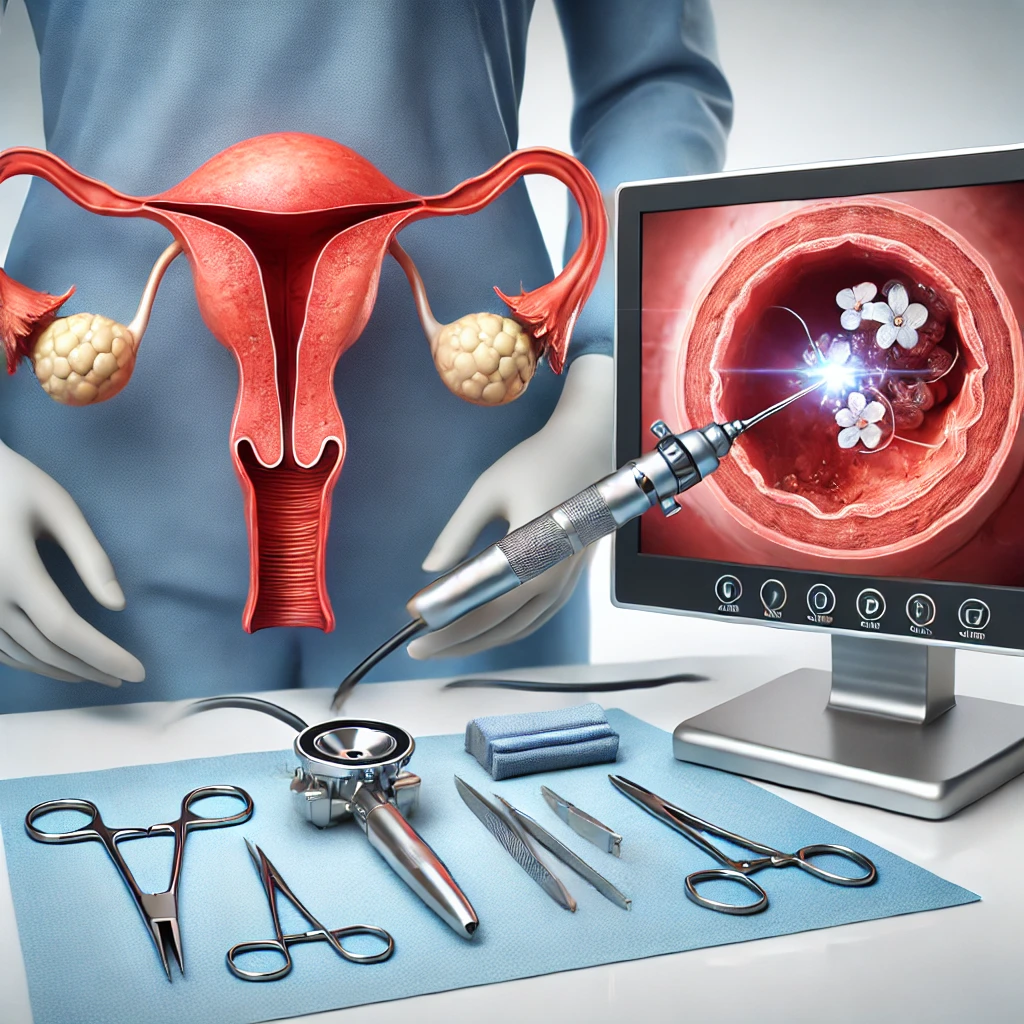Laparoscopic ovarian cyst excision is a minimally invasive surgical procedure used to remove cysts from the ovaries. This technique ensures faster recovery, less pain, and minimal scarring compared to traditional open surgery. At KK Virat Hospital, Karimnagar, our expert surgeons utilize advanced laparoscopic technology to provide precise and effective treatment for ovarian cysts.
Understanding Ovarian Cysts
Ovarian cysts are fluid-filled sacs that develop on or inside the ovaries. Most cysts are benign and disappear on their own, but some may require surgical intervention, especially if they cause pain, grow larger, or pose a risk of complications.

Causes and Risk Factors of Ovarian Cysts
Common causes and risk factors for ovarian cysts include:
- Previous Ovarian Cysts – Women with a history of cysts may have a higher chance of developing them again.
- Hormonal Imbalance – Irregular ovulation due to hormonal fluctuations can lead to cyst formation.
- Polycystic Ovary Syndrome (PCOS) – A condition where multiple cysts develop due to hormonal disorders.
- Pregnancy – Some cysts form as part of the ovulation process during pregnancy.
- Endometriosis – Endometrial tissue can grow outside the uterus, leading to cyst formation in the ovaries.
Symptoms of Ovarian Cysts
Many ovarian cysts do not cause symptoms, but when they do, they may include:
- Frequent Urination – Large cysts may press against the bladder, causing an urge to urinate more frequently.
- Pelvic Pain – A dull or sharp pain in the lower abdomen, which may worsen during menstruation.
- Bloating or Fullness – A feeling of heaviness or swelling in the lower abdomen.
- Irregular Menstrual Cycles – Changes in period flow, timing, or intensity.
- Pain During Intercourse – Some women experience discomfort during sexual activity.
Diagnosis and Laboratory Tests for Ovarian Cysts
To determine the presence, size, and nature of ovarian cysts, doctors may recommend:
- MRI or CT Scan – Offers detailed imaging if further evaluation is needed.
- Pelvic Ultrasound – Provides imaging of the ovaries and cysts.
- Blood Tests (CA-125) – Checks for elevated levels of cancer-related markers.
- Hormone Tests – Helps assess hormonal imbalances that may contribute to cyst formation.
When Is Surgery Needed for Ovarian Cysts?
Surgery is recommended if:
- There is suspicion of malignancy (cancerous growth).
- The cyst is large (more than 5 cm in diameter).
- It causes severe pain or complications.
- It persists or grows despite medication.
What Is Laparoscopic Ovarian Cyst Excision?
Laparoscopic ovarian cyst excision involves small incisions in the abdomen through which a laparoscope (a thin tube with a camera) and surgical instruments are inserted to remove the cyst while preserving the ovary.
Benefits of Laparoscopic Ovarian Cyst Surgery
- Minimally Invasive – Smaller incisions lead to less scarring and faster healing.
- Less Pain – Reduced postoperative discomfort compared to open surgery.
- Shorter Hospital Stay – Most patients can return home the same day.
- Quick Recovery – Faster return to normal activities.
- Lower Risk of Infection – Small incisions reduce exposure to external contaminants.
Pre-Surgery Precautions
Before undergoing laparoscopic ovarian cyst removal, patients should:
- Arrange for Assistance – Since anaesthesia is used, ensure a family member or friend is available for post-surgery support.
- Avoid Eating or Drinking – Refrain from consuming food or liquids for at least 6-8 hours before surgery.
- Stop Certain Medications – Consult with your doctor about blood thinners or hormonal treatments.
- Undergo Preoperative Tests – Routine blood tests and imaging scans may be required.
Post-Surgery Recovery and Care
- Pain Management – Mild discomfort is normal and can be managed with prescribed painkillers.
- Rest and Hydration – Allow the body to heal by getting adequate rest and staying hydrated.
- Avoid Strenuous Activities – Refrain from heavy lifting or intense exercise for a few weeks.
- Follow-Up Appointments – Attend scheduled visits to monitor healing progress.
- Watch for Complications – Seek medical attention if you experience fever, severe pain, or unusual discharge.
Possible Complications of Laparoscopic Ovarian Cyst Surgery
Although rare, complications may include:
- Recurrence of Cysts – Some women may develop new cysts in the future.
- Infection – Mild infections can occur but are preventable with proper care.
- Bleeding – Some bleeding is expected, but excessive bleeding needs medical attention.
- Damage to Surrounding Organs – Rare but possible risk involving nearby structures like the bladder or intestines.
Can Ovarian Cysts Be Treated Without Surgery?
Non-surgical treatments for ovarian cysts include:
- Lifestyle Changes – Maintaining a healthy diet and weight can help balance hormones and prevent cyst growth.
- Hormonal Therapy – Birth control pills or other hormonal medications to regulate ovulation.
- Pain Management – Over-the-counter painkillers can help alleviate mild symptoms.
Why Choose KK Virat Hospital for Laparoscopic Ovarian Cyst Surgery?
- At KK Virat Hospital, Karimnagar, we offer:
- Expert Laparoscopic Surgeons – Skilled professionals specializing in minimally invasive gynaecological procedures.
- Advanced Medical Equipment – Cutting-edge technology for accurate diagnosis and safe surgery.
- Personalized Patient Care – Individualized treatment plans ensure comfort and optimal recovery.
- Affordable and High-Quality Services – Cost-effective solutions without compromising on quality.
Book Your Appointment Today
If you are experiencing symptoms of ovarian cysts or need surgical treatment, schedule a consultation with KK Virat Hospital, Karimnagar. Our specialists are here to provide expert care and ensure a smooth recovery. Contact us today to book your appointment!
- Call Us Directly: Get in touch with our medical coordinators to schedule an appointment with an expert urologist.
- Direct Visit: You can visit our hospital directly by carrying your previous medical records if you have a medical history. However, admission will be based on the doctor’s recommendation.
What is laparoscopic ovarian cyst excision surgery?
Laparoscopic ovarian cyst excision is a minimally invasive procedure to remove cysts from the ovaries using small incisions and a camera-assisted technique.
How long does laparoscopic ovarian cyst surgery take?
The procedure typically takes 30 to 90 minutes, depending on the size and complexity of the cyst.
Is laparoscopic ovarian cyst removal painful?
The surgery is performed under general anaesthesia, so you won’t feel pain during the procedure. Post-surgery discomfort is minimal and manageable with medication
What is the recovery time after laparoscopic ovarian cyst surgery?
Most patients recover within 1 to 2 weeks, with some returning to work in a few days, depending on their overall health and job type.
When should an ovarian cyst be removed?
Surgery is recommended for cysts that are large, cause pain, do not resolve on their own, or have the potential to be cancerous.
Can ovarian cysts come back after laparoscopic surgery?
While the removed cysts do not return, new cysts may develop in the future, especially in women with conditions like PCOS.
Will laparoscopic ovarian cyst surgery affect my fertility?
In most cases, the procedure preserves ovarian function and does not impact fertility. However, it depends on the type and extent of cyst removal.
What should I avoid after laparoscopic ovarian cyst removal?
Patients should avoid heavy lifting, strenuous activities, and sexual intercourse for at least two weeks to allow proper healing.
Is laparoscopic ovarian cyst removal safe?
Yes, it is a safe and commonly performed procedure with a low risk of complications, especially when done by experienced surgeons.
How much does laparoscopic ovarian cyst surgery cost in India?
The cost varies based on the hospital, surgeon, and complexity of the surgery, but it is generally more affordable compared to open surgery. Contact KK Virat Hospital for specific pricing details.


